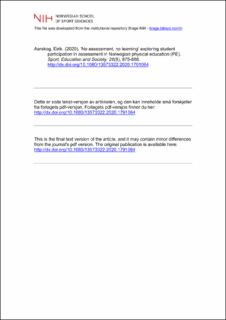| dc.contributor.author | Aarskog, Eirik | |
| dc.date.accessioned | 2022-03-04T08:49:13Z | |
| dc.date.available | 2022-03-04T08:49:13Z | |
| dc.date.created | 2020-09-08T10:15:50Z | |
| dc.date.issued | 2021 | |
| dc.identifier.citation | Sport, Education and Society. 2021, 26(8), 875-888. | en_US |
| dc.identifier.issn | 1357-3322 | |
| dc.identifier.uri | https://hdl.handle.net/11250/2982998 | |
| dc.description | I Brage finner du siste tekst-versjon av artikkelen, og den kan inneholde ubetydelige forskjeller fra forlagets pdf-versjon. Forlagets pdf-versjon finner du på www.tandfonline.com / In Brage you'll find the final text version of the article, and it may contain insignificant differences from the journal's pdf version. The original publication is available at www.tandfonline.com | en_US |
| dc.description.abstract | In contemporary educational literature assessment is viewed as a key element of pedagogy, and student self- and peer-assessment is viewed as a vital component of the assessment processes occurring within pedagogical practice. This notion is also present within physical education (PE) literature. Within this body of work however, there has been little attention on how students participate in their own assessment. The focus has rather been towards the teacher’s assessment practices. The aim of this paper is therefore to explore how students themselves participate in the assessment processes that occur in PE. By drawing on assessment theory presented by Black and Wiliam (2009. Developing the theory of formative assessment. Educational Assessment, Evaluation and Accountability, 21(1), 5–31. https://doi.org/10.1007/s11092-008-9068-5) and the educational perspective of American pragmatist John Dewey, the paper presents a theoretical reconceptualization of assessment that can occur within learning situations. By utilizing this conceptualization to analyse empirical material gathered within the Norwegian PE context, the paper presents findings under three main headings. These are participating in establishing; (1) where the students are in their learning, (2) where the students are going in their learning and (3) how to get where they are going. The paper concludes with a discussion of the results and general implications of the findings for both practitioners and researchers interested in the phenomenon of assessment in PE. | en_US |
| dc.language.iso | eng | en_US |
| dc.subject | physical education | en_US |
| dc.subject | self-assessment | en_US |
| dc.subject | peer-assessment | en_US |
| dc.subject | student particiation | en_US |
| dc.subject | John Dewey | en_US |
| dc.title | ‘No assessment, no learning’ exploring student participation in assessment in Norwegian physical education (PE) | en_US |
| dc.type | Peer reviewed | en_US |
| dc.type | Journal article | en_US |
| dc.description.version | acceptedVersion | en_US |
| dc.source.pagenumber | 14 | en_US |
| dc.source.journal | Sport, Education and Society | en_US |
| dc.identifier.doi | 10.1080/13573322.2020.1791064 | |
| dc.identifier.cristin | 1827971 | |
| dc.description.localcode | Institutt for lærerutdanning og friluftslivsstudier / Department of Teacher Education and Outdoor Studies | en_US |
| cristin.ispublished | true | |
| cristin.fulltext | postprint | |
| cristin.qualitycode | 2 | |
